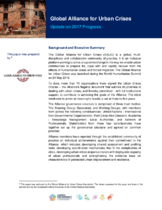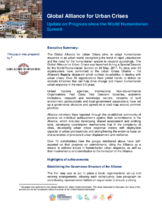This site is inactive as of February 2020. For updated information on an initiative's work, please refer to their own website as listed in their contact details.
Summary
The humanitarian landscape is changing. With more than half of the world’s population already residing in cities, and growing, urbanization is defining our global reality. Rapid and often unplanned urbanization continues unabated, including in fragile settings, and is exacerbating the impacts of a range of natural and man-made disasters. Armed conflict and the use of explosive weapons in densely populated areas cause death and injury amongst civilians; earthquakes inflict unique levels of devastation in cities, as do severe storms and floods. But urban areas can also offer sanctuary: the majority of internally displaced people and refugees have sought refuge in cities and towns around the world.
The intersection of urbanization with conflict, displacement and climate change calls into question traditional ways humanitarians respond to crises. The Global Alliance for Urban Crises has emerged to address these trends and challenges.The Alliance promotes a vision of inclusive, safe, resilient, and sustainable cities and towns, as laid out in the 2030 Agenda for Sustainable Development.
The Alliance will provide knowledge, build capacities and develop data-informed and evidence-based approaches in order to more effectively prevent, prepare for, and respond to humanitarian crises in urban settings; ultimately contributing to longer term, recovery, development and resilience building efforts.
Partners
Alliance is a multi-stakeholder initiative made up of a broad membership that also includes actors not traditionally considered humanitarian responders: development actors, urban professionals such as planners, architects and engineers, and local authority networks. Together, their work will bring about a fundamental transformation in the way that international and local actors interact with each other in response to urban humanitarian crises.

Goals
Partners in the Alliance commit to achieving results in four key areas:
-
Tailoring humanitarian response to the urban context by developing shared assessment and profiling tools, promoting joint analysis, and adapting coordination mechanisms;
-
Developing or working with existing global, regional and national rosters to facilitate the deployment of urban leaders, managers and technical experts;
-
Building the evidence base on the specific characteristics of protracted displacement in urban areas, and contributing to the design of appropriate and cost-effective responses, with particular regard to protection of vulnerable people, shelter, basic services and infrastructure, and;
-
Ensuring that initiatives focused on building urban resilience incorporate components on resilient response and recovery from crises, and that they leverage greatest impact in cities most at risk of humanitarian emergencies.
Partners are already working towards the four key areas, leading initiatives which address the unique characteristics of urban crises, building evidence-based initiatives to address resilience, displacement, and localization of aid by coordinating with networks, local municipalities and relevant stakeholders to ensure commitments towards the four areas are achieved.
The Alliance is committed to leveraging resources, networks and technical capacity for high-impact, transparent and effective results.
Resources





 summary
summary partners
partners goals
goals Stakeholder reports
Stakeholder reports resources
resources contacts
contacts